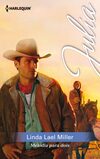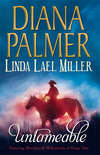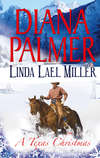Kitabı oku: «Sierra's Homecoming», sayfa 3
Sierra paused, shut off the faucet, dried her hands. The timer on the microwave dinged. “I was about to cook,” she said.
Travis grinned. “Good thing I got to you in time,” he answered. “If you’re anything like your sister, you shouldn’t be allowed to get near a stove.”
If you’re anything like your sister.
The words saddened Sierra, settled bleak and heavy over her heart. She didn’t know whether she was like her sister or not; until Meg had e-mailed her a smiling picture a few weeks ago, she wouldn’t have recognized her on the street.
“Did I say something wrong?” Travis asked.
“No,” Sierra said quickly. “It was—thoughtful of you to bring the chicken.”
Liam must have heard Travis’s voice, because he came pounding into the room, all smiles.
“Hey, Travis,” he said.
“Hey, cowpoke,” Travis replied.
“The computer’s making a dinging noise,” Liam reported.
Travis smiled, set the bag of chicken on the counter but made no move to take off his hat and coat. “Meg’s got it set to do that, so she’ll remember to check her e-mail when she’s here,” he said.
“Mom won’t let me log on,” Liam told him.
Travis glanced at Sierra, turned to Liam again. “Rules are rules, cowpoke,” he said.
“Rules bite,” Liam said.
“Ninety-five percent of the time,” Travis agreed.
Liam recovered quickly. “Are you going to stay and eat with us?”
Travis shook his head. “I’d like that a lot, but I’m expected somewhere else for supper,” he answered.
Liam looked sorely disappointed.
Sierra wondered where that “somewhere else” was, and with whom Travis would be sharing a meal, and was irritated with herself. It was none of her business, and besides, she didn’t care what he did or who he did it with anyway. Not the least little bit.
“Maybe another time,” Travis said.
Liam sighed and retreated to the study and his allotted hour of television.
“You shouldn’t have,” Sierra said, indicating their supper with a nod.
“It’s your first night here,” Travis answered, opening the door to leave. “Seemed like the neighborly thing to do.”
“Thank you,” Sierra said, but he’d already closed the door between them.
Travis started up his truck, just in case Sierra was listening for the engine, drove it around behind the barn and parked. After stopping to check on Baldy and the three other horses in his care, he shrugged down into the collar of his coat and slogged to his trailer.
The quarters were close, smaller than the closet off his master bedroom at home in Flagstaff, but he didn’t need much space. He had a bed, kitchen facilities, a bathroom and a place for his laptop. It was enough.
More than Brody was ever going to have.
He took off his hat and coat and tossed them on to the built-in, padded bench that passed for a couch. He tried not to think about Brody, and in the daytime, he stayed busy enough to succeed. At night, it was another matter. There just wasn’t enough to do after dark, especially out here in the boonies, once he’d nuked a frozen dinner and watched the news.
He thought about Sierra and the boy, in there in the big house, eating the chicken and fixings he’d picked up in the deli at the one and only supermarket in Indian Rock. He’d never intended to join them, since they’d just arrived and were settling in, but he could picture himself sitting down at that long table in the kitchen, just the same.
He rooted through his refrigerator, something he had to crouch to do, and chose between Salisbury steak, Salisbury steak and Salisbury steak.
While the sectioned plastic plate was whirling round and round in the lilliputian microwave that came with the trailer, he made coffee and remembered his last visit from Rance McKettrick. Widowed, Rance lived alone in the house his legendary ancestor, Rafe, had built for his wife, Emmeline, and their children, back in the 1880s. He had two daughters, whom he largely ignored.
“This place is just a fancy coffin,” Rance had observed, in his blunt way, when he’d stepped into the trailer. “Brody’s the one that’s dead, Trav, not you.”
Travis rubbed his eyes with a thumb and forefinger. Brody was dead, all right. No getting around that. Seventeen, with everything to live for, and he’d blown himself up in the back room of a slum house in Phoenix, making meth.
He looked into the window over the sink, saw his own reflection.
Turned away.
His cell phone rang, and he considered letting voice mail pick up, but couldn’t make himself do it. If he’d answered the night Brody called…
He fished the thing out, snapped it open and said, “Reid.”
“Whatever happened to ‘hello’?” Meg asked.
The bell on the microwave rang, and Travis reached in to retrieve his supper, burned his hand and cursed.
She laughed. “Better and better.”
“I’m not in the mood for banter, Meg,” he replied, turning on the water with his free hand and then switching to shove his scorched fingers into the flow.
“You never are,” she said.
“The horses are fine.”
“I know. You would have called me if they weren’t.”
“Then what do you want?”
“My, my, we are testy tonight. I called, you big grouch, to ask about my sister and my nephew. Are they okay? How do they look? Sierra is so private, she’s almost standoffish.”
“You can say that again.”
“Thank you, but in the interest of brevity, I won’t.”
“Since when do you give a damn about brevity?” Travis inquired, but he was grinning by then.
Once again Meg laughed. Once again Travis wished he’d been able to fall in love with her. They’d tried, the two of them, to get something going, on more than one occasion. Meg wanted a baby, and he wanted not to be alone, so it made sense. The trouble was, it hadn’t worked.
There was no chemistry.
There was no passion.
They were never going to be anything more than what they were—the best of friends. He was mostly resigned to that, but in lonely moments, he ached for things to be different.
“Tell me about my sister,” Meg insisted.
“She’s pretty,” Travis said. Real pretty, added a voice in his mind. “She’s proud, and overprotective as hell of the kid.”
“Liam has asthma,” Meg said quietly. “According to Sierra, he nearly died of it a couple of times.”
Travis forgot his burned fingers, his Salisbury steak and his private sorrow. “What?”
Meg let out a long breath. “That’s the only reason Sierra’s willing to have anything to do with Mom and me. Mom put her on the company health plan and arranged for Liam to see a specialist in Flagstaff on a regular basis. In return, Sierra had to agree to spend a year on the ranch.”
Travis stood still, absorbing it all. “Why here?” he asked. “Why not with you and Eve in San Antonio?”
“Mom and I would love that,” Meg said, “but Sierra needs…distance. Time to get used to us.”
“Time to get used to two McKettrick women. So we’re talking, say, the year 2050, give or take a decade?”
“Very funny. Sierra is a McKettrick woman, remember? She’s up to the challenge.”
“She is definitely a McKettrick,” Travis agreed ruefully. And very definitely a woman. “How did you find her?”
“Mom tracked her and Hank down when Sierra was little,” Meg answered.
Travis dropped on to the edge of his bed, which was unmade. The sheets were getting musty, and every night, the pizza crumbs rubbed his hide raw. One of these days he was going to haul off and change them.
“‘Tracked her down’?”
“Yes,” Meg said, with a sigh. “I guess I didn’t tell you about that part.”
“I guess you didn’t.” Travis had known about the kidnapping, how Sierra’s father had taken off with her the day the divorce papers were served, and that the two of them had ended up in Mexico. “Eve knew, and she still didn’t lift a finger to get her own daughter back?”
“Mom had her reasons,” Meg answered, withdrawing a little.
“Oh, well, then,” Travis retorted, “that clears everything up. What reason could she possibly have?”
“It’s not my place to say, Trav,” Meg told him sadly. “Mom and Sierra have to work it all through first, and it might be a while before Sierra’s ready to listen.”
Travis sighed, shoved a hand through his hair. “You’re right,” he conceded.
Meg brightened again, but there was a brittleness about her that revealed more than she probably wanted Travis to know, close as they were. “So,” she said, “what would you say Mom’s chances are? Of reconnecting with Sierra, I mean?”
“The truth?”
“The truth,” Meg said, without enthusiasm.
“Zero to zip. Sierra’s been pleasant enough to me, but she’s as stubborn as any McKettrick that ever drew breath, and that’s saying something.”
“Gee, thanks.”
“You said you wanted the truth.”
“How can you be so sure Mom won’t be able to get through to her?”
“It’s just a hunch,” Travis said.
Meg was quiet. Travis was famous for his hunches. Too bad he hadn’t paid attention to the one that said his little brother was in big trouble, and that Travis ought to drop everything and look for Brody until he found him.
“Look, maybe I’m wrong,” he added.
“What’s your real impression of Sierra, Travis?”
He took his time answering. “She’s independent to a fault. She’s built a wall around herself and the kid, and she’s not about to let anybody get too close. She’s jumpy, too. If it wasn’t for Liam, and the fact that she probably doesn’t have two nickels to rub together, she definitely wouldn’t be on the Triple M.”
“Damn,” Meg said. “We knew she was poor, but—”
“Her car gave out in the driveway as soon as she pulled in. I took a peek under the hood, and believe me, the best mechanic on the planet couldn’t resurrect that heap.”
“She can drive my Blazer.”
“That might take some convincing on your part. This is not a woman who wants to be obliged. It’s probably all she can do not to grab the kid and hop on the next bus to nowhere.”
“This is depressing,” Meg said.
Travis got up off the bed, peeled back the plastic covering his dinner, and poked warily at the faux meat with the tip of one finger. Talk about depressing.
“Hey,” he said. “Look on the bright side. She’s here, isn’t she? She’s on the Triple M. It’s a start.”
“Take care of her, Travis.”
“As if she’d go along with that.”
“Do it for me.”
“Oh, please.”
Meg paused, took aim, and scored a bull’s-eye. “Then do it for Liam.”
Chapter Four
1919
Doss left the house after supper, ostensibly to look in on the livestock one last time before heading upstairs to bed, leaving the dishwashing to Tobias and Hannah. He stood still in the dooryard, raising the collar of his coat against the wicked cold. Stars speckled the dark, wintry sky.
In those moments he missed Gabe with a piercing intensity that might have bent him double, if he wasn’t McKettrick proud. That was what his mother called the quality, anyhow. In the privacy of his own mind, Doss named it stubbornness.
Thinking of his ma made his pa come to mind, too. He missed them almost as sorely as he did Gabe. His uncles, Rafe and Kade and Jeb, along with their wives, were all down south, around Phoenix, where the weather was more hospitable to their aging bones. Their sons, to a man, were still in the army, even though the war was over, waiting to be mustered out. Their daughters had all married, every one of them keeping the McKettrick name, and lived in places as far-flung as Boston, New York and San Francisco.
There was hardly a McKettrick left on the place, save himself and Hannah and Tobias. It deepened Doss’s loneliness, knowing that. He wished everybody would just come back home, where they belonged, but it would have been easier to herd wild barn cats than that bunch.
Doss looked back toward the house. Saw the lantern glowing at the kitchen window. Smiled.
The moment he’d gone outside, Hannah must have switched off the bulb. She worried about running short of things, he’d noticed, even though she’d come from a prosperous family, and certainly married into one.
His throat tightened. He knew she’d been different before he brought Gabe home in a pine box, but then, they all had. Gabe’s going left a hole in the fabric of what it meant to be a McKettrick, and not a tidy one, stitched at the edges. Rather, it was a jagged tear, and judging by the raw newness of his own grief, Doss had little hope of it ever mending.
Time heals, his mother had told him after they’d laid Gabe in the ground up there on the hill, with his Grandpa Angus and those that had passed after him, but she’d had tears in her eyes as she said it. As for his pa, well, he’d stood a long time by the grave. Stood there until Rafe and Kade and Jeb brought him away.
Doss thrust out a sigh, remembering. “Gabe,” he said, under his breath, “Hannah says it’s wrong of me, but I still wish it had been me instead of you.”
He’d have given anything for an answer, but wherever Gabe was, he was busy doing other things. Maybe they had fishing holes up there in the sky, or cattle to round up and drive to market.
“Take care of Hannah and my boy,” Gabe had told him, in that army infirmary, when they both knew there would be no turning the illness around. “Promise me, Doss.”
Doss had swallowed hard and made that promise, but it was a hard one to keep. Hannah didn’t seem to want taking care of, and every morning when Doss woke up, he was afraid this would be the day she’d decide to go back to her own people, up in Montana, and stay gone for good.
The back door opened, startling Doss out of his musings. He hesitated for a moment, then tramped in the direction of the barn, trying to look like a man bent on a purpose.
Hannah caught up, bundled into a shawl and carrying a lighted lantern in one hand.
“I think I’m going mad,” she blurted out.
Doss stopped, looked down at her in puzzled concern. “It’s the grief, Hannah,” he told her gruffly. “It will pass.”
“You don’t believe that any more than I do,” Hannah challenged, catching up with herself. The snow was deep and getting deeper, and the wind bit straight through to the marrow.
Doss moved to the windward side, to be a buffer for her. “I’ve got to believe it,” he said. “Feeling this bad forever doesn’t bear thinking about.”
“I put the teapot away,” Hannah said, her breath coming in puffs of white, “I know I put it away. But I must have gotten it out again, without knowing or remembering, and that scares me, Doss. That really scares me.”
They reached the barn. Doss took the lantern from her and hauled open one of the big doors one-handed. It wasn’t easy, since the snow had drifted, even in the short time since he’d left off feeding and watering the horses and the milk cow and that cussed mule Seesaw. The critter was a son of Doss’s mother’s mule, who’d borne the same name, and he was a son of something else, too.
“Maybe you’re a mite forgetful these days,” Doss said, once he’d gotten her inside, out of the cold. The familiar smells and sounds of the darkened barn were a solace to him—he came there often, even when he didn’t have work to do, which was seldom. On a ranch, there was always work to do—wood to chop, harnesses to mend, animals to look after. “That doesn’t mean you’re not sane, Hannah.”
Don’t say it, he pleaded silently. Don’t say you might as well take Tobias and head for Montana.
It was a selfish thought, Doss knew. In Montana, Hannah could live a city life again. No riding a mule five miles to fetch the mail. No breaking the ice on the water troughs on winter mornings, so the cattle and horses could drink. No feeding chickens and dressing like a man.
If Hannah left the Triple M, Doss didn’t know what he’d do. First and foremost, he’d have to break his promise to Gabe, by default if not directly, but there was more to it than that. A lot more.
“There’s something else, too,” Hannah confided.
To keep himself busy, Doss went from stall to stall, looking in on sleepy horses, each one confounded and blinking in the light of his lantern. He was giving Hannah space, enough distance to get out whatever it was she wanted to say.
“What?” he asked, when she didn’t speak again right away.
“Tobias. He just told me—he told me—”
Doss looked back, saw Hannah standing in the moonlit doorway, rimmed in silver, with one hand pressed to her mouth.
He went back to her. Set the lantern aside and took her by the shoulders. “What did he tell you, Hannah?”
“Doss, he’s seeing things.”
He tensed on the inside. Would have shoved a hand through his hair in agitation if he hadn’t been wearing a hat and his ears weren’t bound to freeze if he took it off. “What kind of things?”
“A boy.” She took hold of his arm, and her grip was strong for such a small woman. It did curious things to him, feeling her fingers on him, even through the combined thickness of his coat and shirt. “Doss, Tobias says he saw a boy in his room.”
Doss looked around. There was nothing but bleak, frozen land for miles around. “That’s impossible,” he said.
“You’ve got to talk to him.”
“Oh, I’ll talk to him, all right.” Doss started for the house, so fixed on getting to Tobias that he forgot all about keeping Hannah sheltered from the wind. She had to lift her skirts to keep pace with him.
Present Day
“Tell me about the boy you saw in your room,” Sierra said, when they’d eaten their fill of fried chicken, macaroni salad, mashed potatoes with gravy, and corn on the cob.
Liam’s gaze was clear as he regarded her from his side of the long table. “He’s a ghost,” he replied, and waited, visibly expecting the statement to be refuted.
“Maybe an imaginary playmate?” Sierra ventured. Liam was a lonely little boy; their lifestyle had seen to that. After her father had died, drunk himself to death in a back-street cantina in San Miguel, the two of them had wandered like gypsies. San Diego. North Carolina, Georgia, and finally Florida.
“There’s nothing imaginary about him,” Liam said staunchly. “He wears funny clothes, like those kids on those old-time shows on TV. He’s a ghost, Mom. Face it.”
“Liam—”
“You never believe anything I tell you!”
“I believe everything you tell me,” Sierra insisted evenly. “But you’ve got to admit, this is a stretch.” Again she thought of the teapot. Again she pushed the recollection aside.
“I never lie, Mom.”
She moved to pat his hand, but he pulled back. The set of his jaw was stubborn, and his gaze drilled into her, full of challenge. She tried again. “I know you don’t lie, Liam. But you’re in a strange new place and you miss your friends and—”
“And you won’t even let me see if they sent me e-mails!” he cried.
Sierra sighed, rested her elbows on the tabletop and rubbed her temples with the fingertips of both hands. “Okay,” she relented. “You can log on to the Internet. Just be careful, because that computer is expensive, and we can’t afford to replace it.”
Suddenly Liam’s face was alight. “I won’t break it,” he promised, with exuberance.
Sierra wondered if he’d just scammed her, if the whole boy-in-the-bedroom thing was a trick to get what he wanted.
In the next instant she was ashamed. Liam was direct to a fault. He believed he’d seen another child in his empty bedroom. She’d call his new doctor in Flagstaff in the morning, talk to the woman, see what a qualified professional made of the whole thing. She offered a silent prayer that her car would start, too, because the doctor was going to want to see Liam, pronto.
Meanwhile, Liam got to his feet and scrambled out of the room.
Sierra cleared away the supper mess, then followed him, as casually as she could, to the room at the front of the house.
He was already online.
“Just what I thought!” he crowed. “My mailbox is bulging.”
The TV was still on, a narrator dolefully describing the effects of a second ice age, due any minute. Run for the hills. Sierra shut it off.
“Hey,” Liam objected. “I was listening to that.”
Sierra approached the computer. “You’re only seven,” she said. “You shouldn’t be worrying about the fate of the planet.”
“Somebody’s got to,” Liam replied, without looking at her. “Your generation is doing a lousy job.” He was staring, as if mesmerized, into the computer screen. Its bluish-gray light flickered on the lenses of his glasses, making his eyes disappear. “Look! The whole Geek Group wrote to me!”
“I asked you not to—”
“Okay,” Liam sighed, without looking at her. “The brilliant children in the gifted program are engaging in communication.”
“That’s better,” Sierra said, sparing a smile.
“You’ve got a few e-mails waiting yourself,” Liam announced. He was already replying to the cybermissives, his small fingers ranging deftly over the keyboard. He’d skipped the hunt-and-peck method entirely, as had all the other kids in his class. Using a computer came naturally to Liam, almost as if he’d been born knowing how, and she knew this was a common phenomenon, which gave her some comfort.
“I’ll read them later,” Sierra answered. She didn’t have that many friends, so most of her messages were probably sales pitches of the penis-enlargement variety. How had she gotten on that kind of list? It wasn’t as if she visited porn sites or ordered battery-operated boyfriends online.
“They get to watch a real rocket launch!” Liam cried, without a trace of envy. “Wow!”
“Wow indeed,” Sierra said, looking around the room. According to Meg, it had originally been a study. Old books lined the walls on sturdy shelves, and there was a natural rock fireplace, too, with a fire already laid.
Sierra found a match on the mantelpiece, struck it and lit the blaze.
A chime sounded from the computer.
“Aunt Meg just IM’d you,” Liam said.
Where had he gotten this “Aunt Meg” thing? He’d never even met the woman in person, let alone established a relationship with her. “‘IM’d’?” she asked.
“Instant Message,” Liam translated. “Guess you’d better check it out. Just make it quick, because I’ve still got a pile of mail to answer.”
Smiling again, Sierra took the chair Liam so reluctantly surrendered and read the message from Meg.
Travis tells me your car died. Use my Blazer. The keys are in the sugar bowl beside the teapot.
Sierra’s pride kicked in. Thanks, she replied, at a fraction of Liam’s typing speed, but I probably won’t need it. My car is just…She paused. Her car was just what? Old? tired, she finished, inspired.
The Blazer won’t run when I come back if somebody doesn’t charge up the battery. It’s been sitting too long, Meg responded quickly. She must have been as fast with a keyboard as Liam.
Is Travis going to report on everything I do? Sierra wrote. She made so many mistakes, she had to retype the message before hitting Send, and that galled her.
Yes, Meg wrote. Because I plan to nag every last detail out of him.
Sierra sighed. It won’t be that interesting, she answered, taking her time so she wouldn’t have to revise. She was out of practice, and if she hoped to land anything better than a waitressing job in Indian Rock, she’d better polish her computer skills.
Meg sent a smiley face, followed by, Good night, Sis. (I’ve always wanted to say that.)
Sierra bit her lower lip. Good night, she tapped out, and rose from the chair with a glance at the clock on the mantel above the now-snapping fire.
Why had she lit it? She was exhausted, and now she would either have to throw water on the flames or wait until they died down. The first method, of course, would make a terrible mess, so that was out.
“Hurry up and finish what you’re doing,” she told Liam, who had plopped in the chair again the moment Sierra got out of it. “Half an hour till bedtime.”
“I had a nap,” Liam reminded her, typing simultaneously.
“Finish,” Sierra repeated. With that, she left the study, climbed the stairs and went into Liam’s room to get his favorite pajamas from one of the suitcases. She meant to put them in the clothes dryer for a few minutes, warm them up.
Something drew her to the window, though. She looked down, saw that the lights were on in Travis’s trailer and his truck was parked nearby. Evidently, he hadn’t stayed long in town, or wherever he’d gone.
Why did it please her so much, knowing that?
1919
Hannah stood in the doorway of Tobias’s room, watching her boy sleep. He looked so peaceful, lying there, but she knew he had bad dreams sometimes. Just the night before, in the wee small hours, he’d crawled into bed beside her, snuggled as close as his little-boy pride would allow, and whispered earnestly that she oughtn’t die anytime soon.
She’d been so choked up, she could barely speak.
Now she wanted to wake him, hold him tight in her arms, protect him from whatever it was in his mind that made him see little boys that weren’t there.
He was lonely, that was all. He needed to be around other children. Way out here, he went to a one-room school, when it wasn’t closed on account of snow, with only seven other pupils, all of whom were older than he was.
Maybe she should take him home to Montana. He had cousins there. They’d live in town, too, where there were shops and a library and even a moving-picture theater. He could ride his bicycle, come spring, and play baseball with other boys.
Hannah’s throat ached. Gabe had wanted his son raised here, on the Triple M. Wanted him to grow up the way he had, rough-and-tumble, riding horses, rounding up stray cattle, part of the land. Of course, Gabe hadn’t expected to die young—he’d meant to come home, so he and Hannah could fill that big house with children. Tobias would have had plenty of company then.
A tear slipped down Hannah’s cheek, and she swatted it away. Straightened her spine.
Gabe was gone, and there weren’t going to be any more children.
She heard Doss climbing the stairs, and wanted to move out of the doorway. He thought she was too fussy, always hovering over Tobias. Always trying to protect him.
How could a man understand what it meant to bear and nurture a child?
Hannah closed her eyes and stayed where she was.
Doss stopped behind her, uncertain. She could feel that, along with the heat and sturdy substance of his body.
“Leave the child to sleep, Hannah,” he said quietly.
She nodded, closed Tobias’s door gently and turned to face Doss there in the darkened hallway. He carried a book under one arm and an unlit lantern in his other hand.
“It’s because he’s lonesome,” she said.
Doss clearly knew she was referring to Tobias’s hallucination. “Kids make up playmates,” he told her. “And being lonesome is a part of life. It’s a valley a person has to go through, not something to run away from.”
No McKettrick ever ran from anything. Doss didn’t have to say it, and neither did she. But she wasn’t a McKettrick, not by blood. Oh, she still wrote the word, whenever she had to sign something, but she’d stopped owning the name the day they put Gabe in the ground.
She wasn’t sure why. He’d been so proud of it, like all the rest of them were.
“Do you ever wish you could live someplace else?” Hannah heard herself say.
“No,” Doss said, so quickly and with such gravity that Hannah almost believed he’d been reading her mind. “I belong right here.”
“But the others—your uncles and cousins—they didn’t stay….”
“Ask any one of them where home is,” Doss answered, “and they’ll tell you it’s the Triple M.”
Hannah started to speak, then held her tongue. Nodded. “Good night, Doss,” she said.
He inclined his head and went on to his own room, shut himself away.
Hannah stood alone in the dark for a long time.
She’d been so happy on the Triple M when Gabe was alive, and even after he’d gone into the army, because she’d never once doubted that he’d return. Come walking up the path with a duffel bag over one shoulder, whistling. She’d rehearsed that day a thousand times in her mind—pictured herself running to meet him, throwing herself into his arms.
It was never going to happen.
Without him, she might as well have been alone on the barren landscape of the moon.
Her eyes filled.
She walked slowly to the end of the hall, into the room where Gabe had brought her on their wedding night. He’d been conceived and born in the big bed there, just as Tobias had. As so many other babes would have been, if only Gabe had lived.
Hannah didn’t undress after she closed the door behind her. She didn’t let her hair down and brush it, like usual, or wash her face at the basin on the bureau.
Instead, she sat down in Lorelei’s rocking chair and waited. Just waited.
For what, she did not know.
Present Day
After Liam had gone to bed, Sierra went back downstairs to the computer and scanned her e-mail. When she spotted Allie Douglas-Fletcher’s return address, she wished she’d waited until morning. She was always stronger in the mornings.
Allie was Adam’s twin sister. Liam’s aunt. After Adam was murdered, while on assignment in South America, Allie had been inconsolable, and she’d developed an unhealthy fixation for her brother’s child.
After taking a deep breath and releasing it slowly, Sierra opened the message. Typically, there was no preamble. Allie got right to the point.
The guest house is ready for you and Liam. You know Adam would want his son to grow up right here in San Diego, Sierra. Tim and I can give Liam everything—a real home, a family, an education, the very best medical care. We’re willing to make a place for you, too, obviously. If you won’t come home, at least tell us you arrived safely in Arizona.
Sierra sat, wooden, staring at the stark plea on the screen. Although Allie and Adam had been raised in relative poverty, both of them had done well in life. Adam had been a photojournalist for a major magazine; he and Sierra had met when he did a piece on San Miguel.
Ücretsiz ön izlemeyi tamamladınız.










